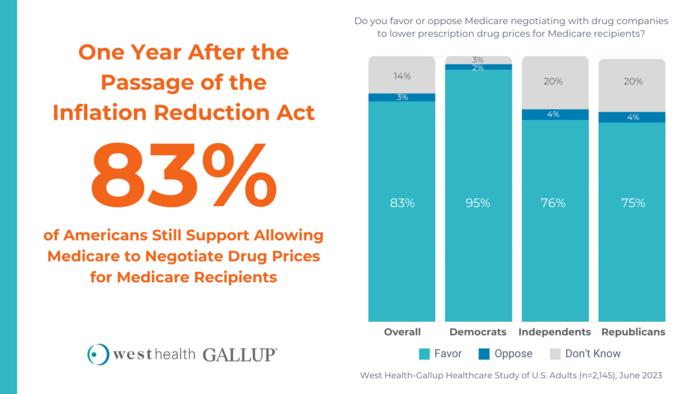SAN DIEGO — August 28, 2023 — As the pharmaceutical industry ramps up efforts to fight the U.S. government’s historic Medicare Drug Price Negotiation Program, a new West Health-Gallup public opinion survey shows overwhelming bipartisan support for the program, which is forecast to save $100 billion in its first decade.

Credit: West Health
SAN DIEGO — August 28, 2023 — As the pharmaceutical industry ramps up efforts to fight the U.S. government’s historic Medicare Drug Price Negotiation Program, a new West Health-Gallup public opinion survey shows overwhelming bipartisan support for the program, which is forecast to save $100 billion in its first decade.
“No matter who they vote for, Americans are suffering from the high costs of prescription drugs,” says Tim Lash, president of West Health, a family of nonprofit organizations focused on reducing healthcare costs and improving quality of care. “The public’s overwhelming support for this policy, even as we head into a presidential election, makes one thing exceedingly clear: people know unfair, anticompetitive behavior when they see it and they want it to stop.”
This week, the Centers for Medicare & Medicaid Services (CMS) will publish the first 10 Medicare drugs selected for the Medicare Drug Price Negotiation Program, with revised prices taking effect January 2026. CMS will then select up to 15 more drugs for 2027, 15 more drugs for 2028, and 20 more drugs for each year after that, as outlined in the Inflation Reduction Act.
But pharmaceutical companies are seeking to block the program through lawsuits and other means, despite broad and enduring public support for Medicare’s ability to negotiate lower prices for the nation’s more-than 65 million Medicare enrollees.
The new West Health-Gallup survey shows 83% of Americans favor price negotiations between Medicare and pharmaceutical companies, including 95% of Democrats, 76% of Independents and 75% of Republicans. Similar levels of support were consistent across age, race, gender, income levels and education.
Dramatic savings are expected from the program. The Congressional Budget Office estimates negotiations directly between Medicare and drug makers could reduce spending by $3.7 billion in its first year and save more than $100 billion over the next decade. But even more importantly, it could save lives. According to a report prepared by research arm of drug distributor AmerisourceBergen for West Health, 112,000 seniors could die prematurely each year because drug prices and associated costs are so high that they can’t afford their medication.
“Big Pharma’s high drug prices are killing us, fueling a public health and humanitarian crisis of its own,” Lash says. “Giving Medicare the power to negotiate is an important step, but we can’t lose sight of the fact that more reforms are needed. Anti-competitive behavior in healthcare is a burden for everyone, regardless of their politics.”
About the West Health-Gallup Survey
The new public opinion survey on Medicare drug-price negotiations was carried out between May 30 and June 6 by Gallup in partnership with West Health. Gallup surveyed 2,145 adults living in all 50 U.S. states and the District of Columbia, All samples are weighted to correct for unequal selection probability and non-response. Post-stratification weighting takes into account gender, age, race, Hispanic ethnicity, education and region. Demographic weighting targets are based on the most recent Current Population Survey figures. The survey carries a margin of error at the 95% confidence level is +2.7 percentage points for response percentages around 50% and is +1.6 percentage points for response percentages around 10% or 90%, design effect included. For reported sub-groups, the margin of error will be larger, typically ranging from ±3.5 to ±6 percentage points.
About West Health
Solely funded by philanthropists Gary and Mary West, West Health is a family of nonprofit and nonpartisan organizations including the Gary and Mary West Foundation and Gary and Mary West Health Institute in San Diego, and the Gary and Mary West Health Policy Center in Washington, D.C. West Health is dedicated to lowering healthcare costs to enable seniors to successfully age with access to high-quality, affordable health and support services that preserve and protect their dignity, quality of life and independence. Learn more at westhealth.org.





